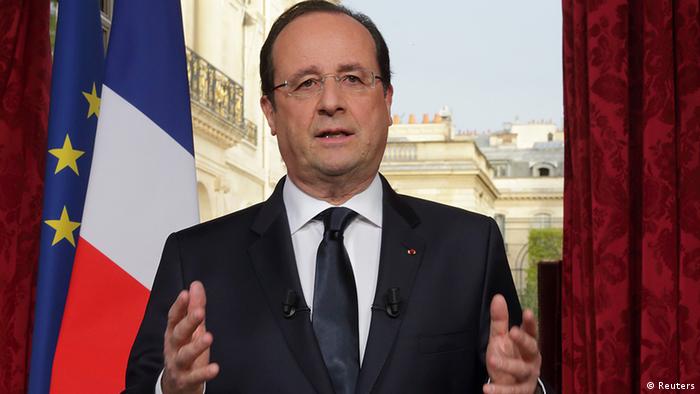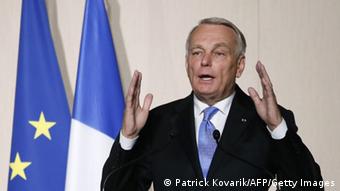Welcome
....to JusticeGhana Group

JusticeGhana is a Non-Governmental [and-not-for- profit] Organization (NGO) with a strong belief in Justice, Security and Progress....” More Details
Hollande has 'no choice' on reform path
- Details
- Parent Category: Africa and The World
- Category: DateLines
- Created on Tuesday, 01 April 2014 00:00
- Hits: 3925
 Hollande has 'no choice' on reform path
Hollande has 'no choice' on reform path
The Socialists' fiasco in the French local elections has piled pressure on President Francois Hollande. But it remains unlikely that he will alter his reform course - on the contrary.
François Hollande is not in an enviable position right now. Just one day after his Parti Socialiste suffered devastating local election results, he had more bad news to contend with - this time from the French National Institute for Statistics and Economic Studies (INSEE), who announced that national debt had risen to new heights - 93.5 percent of economic output. Not only that, the budget deficit was also higher than expected, at 4.3 percent.
These numbers show that Hollande's economic reform program has not yet made an impact. And the election results show that Hollande's Socialists currently have little support among the population. For Carsten Brzeski, chief economist at the ING-Diba bank, these two signals are understandable. "People are dissatisfied because growth is weak and there is high unemployment," he says. "But I think the population doesn't know yet what is in store. The problem is there have hardly actually been any structural reforms yet."
New solutions
But Brzeski believes that reforms are necessary to reduce the debt and reinvigorate the labor market. "The French are in the same situation the Germans were at the start of the 2000s," he said. At the time, Chancellor Gerhard Schröder introduced a raft of reforms dubbed "Agenda 2010." They included a loosening of dismissal protection laws as well as reductions in unemployment benefit, health insurance, and pensions.
Brzeski thinks that France won't be able to avoid taking the same measures. "France has to free itself from the idea that help will come from outside," he said. The country used to keep its economy going by devaluing the franc or implement state-spending programs funded by debts. Both are now impossible, says Brzeski: "So the French are now faced with the difficult task of putting these reforms in place themselves."
The French government already began to make the job market more flexible a few months ago - while at the same time lifting some of the burdens on companies - points out Claire Demesmay of the German Council on Foreign Relations (DGAP). "The unions were included in the process, and major strikes were avoided," she told DW. "It's no Agenda 2010, but it's a first step."
'Responsibility Pact'
But it's also a step that strikes fear into the hearts of many French people. The "Responsibility Pact," as the reform package is known, has the same aim as the German reforms - the reduction in social benefits and the employees' rights. The Socialist Party's left-wing would like to scrap the plan altogether, but even the drubbing at the ballot box won't deter Hollande. "That's illusory, because both the financial markets and France's European partners are looking closely at what the government is doing," said Demesmay.
While the French president enjoys a lot more control over domestic policy than the German chancellor, his opponents are more powerful than their German counterparts too. "The unions in France are much less conciliatory - they have a culture of confrontation," said Demesmay. "Up until now Hollande has opted for a policy of small steps in order to protect his party colleagues and the population. But I don't know if he can maintain that after this election defeat."
 No way back?
No way back?
According to Demesmay, Hollande must now try to communicate more clearly than ever what is at stake. Prime Minister Jean-Marc Ayrault, who resigned following the election defeat, sees it the same way. The government "did not say clearly enough how difficult the country's situation is," he said. In short, there is unlikely to be any deviation in the reform path - at most, the weakest in society will receive a little more consideration.
A cabinet reshuffle won't change that reality, said Brzeski. "Hollande has no other choice but to stay the course," he said. "He can only hope that the first positive signs of a recovery will appear in time for his next presidential election campaign."
Then again, that recovery came too late to save Schröder in Germany. After his government introduced Agenda 2010, Schröder and his Social Democrats lost the population's approval and he had to concede defeat to Angela Merkel in the 2005 election.
Date 01.04.2014
Author Andreas Becker / bk
Editor Nicole Goebel
Source: Deutsche Welle




